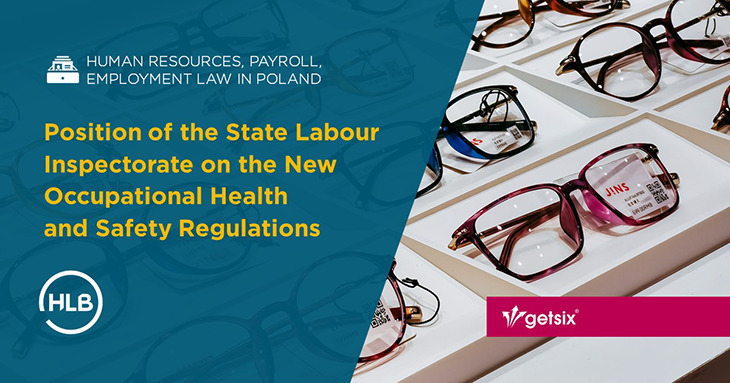Position of the State Labour Inspectorate on the New Occupational Health and Safety Regulations

In the provisions of the regulations of the Minister of Family and Social Policy of 18 October 2023, amending the regulation on occupational safety and health at workstations equipped with screen monitors, specific provisions regarding the financing of corrective glasses or contact lenses for employees were not included. In addition, the aforementioned provisions in this regulation do not address remote work or provide guidelines on applying these provisions to such work.
For this reason, the State Labour Inspectorate (hereinafter: “PIP”) has issued guidelines on how to interpret these unspecified issues.
Obligation to provide employees with corrective glasses or contact lenses
PIP expressed the view that rules and principles related to the implementation of the obligation to provide employees with corrective glasses or contact lenses should be specified in an internal company document, such as in the work regulations. This is due to the fact that the legislator left it to the employers to independently regulate the financing methods of these products.
However, when it comes to the decision on whether the employer must provide an employee with corrective glasses or contact lenses, it remains the responsibility of the doctor who issues a prescription with the appropriate note. We would also like to point out that according to Article 23711a of the Labour Code, employers are obliged to consult with employees or their representatives on all activities related to occupational health and safety.
New OSH rules and remote work
According to the position of PIP, these regulations should be applied accordingly to employees who perform work remotely.
According to Article 6724 § 1 point 1 of the Labour Code, the employer is obliged to provide the employee who works remotely with materials and tools, including technical devices, necessary for remote work. Furthermore, according to Article 6724 § 2, the parties may establish rules for the use of materials and work tools by the employee performing remote work, including technical devices, necessary for remote work, not provided by the employer, meeting the requirements specified in Chapter IV of the tenth section.
In addition to the above, PIP draws attention to Article 215 point 2 of the Labour Code, which states that used machines and other technical devices must comply with ergonomic principles. The authority clarified that, for example, laptops used for work without additional support or an additional monitor, as well as keyboards, do not meet this principle.
We emphasize that this issue applies to employees (including interns and trainees) who use portable systems for at least half of the daily working time.
Given the above, employers are obliged to check whether the arrangements for remote work comply with applicable regulations, and if not, they must introduce appropriate provisions to ensure that their internal regulations are in line with general applicable legal acts.
 Source: The article was created in collaboration with our cooperation partner – sdzlegal Schindhelm Law Office
Source: The article was created in collaboration with our cooperation partner – sdzlegal Schindhelm Law Office
If you have any questions regarding this topic or if you are in need for any additional information – please do not hesitate to contact us:
CUSTOMER RELATIONSHIPS DEPARTMENT

ELŻBIETA NARON
Head of Customer Relationships
Department / Senior Manager
getsix® Group
***





